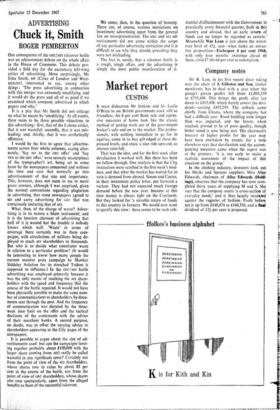CUSTOS Market report
It must dishearten Mr Jenkins and Sir Leslie O'Brien to see British government stock still so friendless. An 8 per cent Bank rate and repres- sive measures at home look like the classic method of getting stock out of the government broker's safe and on to the market. The profes- sionals, with nothing immediate to go for in equities, come in to buy gilt-edged at these de- pressed levels, and enjoy a nice ride upwards as interest rates fall.
That was the idea, and for the first week after devaluation it worked well. But there has been no follow-through, One analysis is that the City institutions were satisfied in the first week's busi- ness, and that what the market has waited for in vain is demand from abroad. Simon and Coates, in their investment policy letter, put forward a variant. They had not expected much foreign demand before the new year, because at this time money is always tight on the Continent. But they looked for 'a sizeable return of funds to this country in January. We would now want to qualify this view: there seems to be such sub- stantial disillusionment with the Government in practically every financial quarter, both in this country and abroad, that an early return of funds can no longer be regarded as certain.' ' Meanwhile War Loan is just above the worst- ever level of 45-I, and—what looks an attrac- tive proposition—Exchequer 4 per cent 1968, with only four months' existence ahead of them, yield £7 16s 6d per cent to redemption.
Company notes
Mr R. Law, in his first report since taking over the chair of J. Gliksten and Son, timber merchants, has to deal with a year when the group's pretax profits fell from £1,069,359 to £755,449. This brings the profit after tax down to £453,498, which barely covers the divi- dends—costing £452,250. The setback came chiefly from Ghana, where the company has had a difficult year. Road building took longer than was expected, and the forest, when reached, proved to be of poor quality, though better wood is now being met. The chairman's forecast of higher profits for the year may have been overtaken by events; for a note elsewhere says that devaluation and the accom- panying measures came when the report was at the printers: 'it is too early to make a realistic assessment of the impact of this situation on the group.'
In the clothing industry, investors look out for Marks and Spencer suppliers. Miss Alice Edwards, chairman of Alice Edwards (Hold- ings), observes that the company has now com- pleted thirty years of supplying M and S. She says that the company meets 'a cross-section of everyday needs,' and is thus largely insulated against the- vagaries of fashion. Profit before tax is up from £148,874 to £160,350, and a find dividend of 121 per cent is proposed.


































 Previous page
Previous page